题目内容
Lessons easily are soon forgotten.
A.1earn B.learned C.to learn D.learning
B

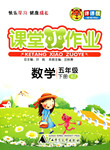 课堂小作业系列答案
课堂小作业系列答案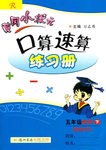 黄冈小状元口算速算练习册系列答案
黄冈小状元口算速算练习册系列答案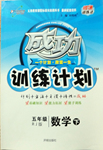 成功训练计划系列答案
成功训练计划系列答案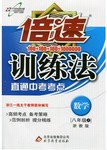 倍速训练法直通中考考点系列答案
倍速训练法直通中考考点系列答案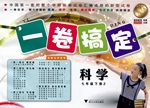 一卷搞定系列答案
一卷搞定系列答案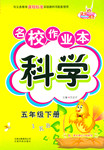 名校作业本系列答案
名校作业本系列答案Dr. Julie Coulton, a British psychologist, focuses her research on the extraordinary function of the play in the physical and spiritual development of children and Martti Bergson from the University of Helsinki shows that playing outside, in the open air, contributes to a better development of the brain.
Thus parents must encourage their children to spend as much time as possible in the open air, and at the same time, to ask schools and kindergartens to assure the small a playground outside. Recent statistics (数据) and studies show an alarming increase of the number of hours spent by children in front of the TV and the computer and a decrease of the time spent outside.
As a consequence more and more children suffer from eye problems and have to wear glasses. Also the problem of fatness among children concerns many parents who don't know what to do anymore to make their children eat healthy and balanced.
Children need a space where to develop their creativity mid parents should encourage them all the time. Too many rules hold back the child's personality and creativity and prevent them to develop the desire to know, to find out, to learn.
If you tell your child so many times: "Don't do that, don't mess the room, don't go there ...", he will lose the desire to do something, anything. Parents must watch their children without suffocating (窒息) them. Should you consider they mustn't do that or this, you have to logically explain them your reasons and they will understand.
Through playing a child learns how to communicate, how to take decisions. Playing is connected to the intellectual, emotional and social progress of the child. Playing lets your children learn how to express his feelings.
【小题1】What is worrying the scientists is that ______.
| A.most parents pay no attention to their children's playing |
| B.most schools and kindergartens have no playgrounds |
| C.most parents encourage their children to watch TV or go surfing |
| D.most children spend more time on TV or tile Internet than on playing outside |
| A.eye problems | B.weight problems |
| C.lack of creativity | D.lack of interest in their lessons |
| A.to allow children to do whatever we want them to do |
| B.never to forbid children to do anything they want to do |
| C.to explain why when you don't let children do something |
| D.to watch children playing anytime to ensure their safety |
| A.How to develop the brain of your children better |
| B.Playing is good for your children in many aspects |
| C.Teaching your children what and how to play |
| D.Don't forbid your children to do anything |
“What is the most important thing you’ve done in your life?”The question was put to me during a presentation I gave to a group of lawyers.
The answer came to me in an instant. It’s not the one I gave, because the situation was not right. As a lawyer in the entertainment industry, I knew the audience wanted to hear some amusing stories about my work with well-known people. but here’s the true answer:
The most important thing I’ve ever done occurred on October 8,1990. I began the day playing tennis with an old friend I hadn’t seen for a while. Between points we talked about what had been happening in each other’s lives. He and his wife had just had a baby boy, who was keeping them up at night.
While we were playing, a car came screaming up the road toward the courts. It was my friend’s father, who shouted to my friend that his baby had stopped breathing and was being rushed to the hospital. In a flash my friend was in the car and gone, disappearing in a cloud of dust.
in the car and gone, disappearing in a cloud of dust.
For a moment I just stood there, paralyzed(呆若木鸡). Then I tried to figure out what I should do. Follow my friend to the hospital? There was nothing I could accomplish there, I convinced myself. My friend’s son was in the care of doctors and nurses, and nothing I could do or say would affect the outcome. Be there for moral support? Well, maybe. But my friend and his wife both had large families, and I knew they’d be surrounded by relatives who would provide more than enough comfort and support, whatever happened. All I could do at the hospital, I decided, was to get in the way. Also, I had planned a full day with my family, who were waiting for me to get home. So I decided to head back to my house and check in my friend later.
As I started my car, I realized that my friend had left his truck and keys at the courts. I now faced another problem. I couldn’t leave the keys in the truck. So I decided to go to the hospital and give him the keys.
When I arrived, I was directed to a room where my friend and his wife were waiting. As I had thought, the room was filled with family members silently watching my friend comfort his wife. I went in and stood by the door, trying to decide what to do next. Soon a doctor appeared. He approached my friend and his wife, and in a quiet voice told them that their son had died.
For a long time the two held each other and cried, unaware of the rest of us standing around in pained silence. After they had calmed themselves, the doctor suggested they spend a few moments with their son.
My friend and his wife stood up and walked past their families. When they reached the door, my friend saw me standing in the corner. He came over and hugged me and started to cry. My friend’s wife hugged me, too, and said , “Thanks for being here.”
For the rest of that morning, I sat in the emergency room of that hospital and watched my friend and his wife hold the body of their infant son, and say goodbye.
It’s the most important thing I have ever done.
The experience taught me two lessons.
First: The most important thing I’ve ever done happened when I was completely helpless. None of the things I had learned in university, in three years of law school or in six years of legal practice were of any use in that situation. Something terrible was happening to people I cared about, and I was powerless to change the outcome. All I could do was standing by and watching it happen. And yet it was critical that I do just that--- just be there when someone needed me.
Second: The most important thing I’ve done almost didn’t happen because of things I had learned in classroom and professional life. Law school taught me how to take a set of facts, break them down and organized them. These skills are critical for lawyers. When people come to us for help, they’re often stressed out and depend on a lawyer to think logically. But while learning to think, I almost forget how to feel. Today I have no doubt that I should have leapt into my car without hesitation and followed my friend to the hospital.
From that one experience I learned that the most important thing in life isn’t the money you make, the status you attain or the honors you achieve. The most important thing in life is the kids’ team you coach or the poem you write----or the time when you’re just somebody’s friend.
【小题1】When he was asked about the most important thing he had done in life at a presentation, the author __________.
A felt it was not an interesting question
B. thought for a while and spoke his mind
C. gave an answer from a lawyer’s point of view
D. didn’t give the real answer
【小题2】When he saw his friend rush to the hospital, the author could not decide whether to follow mainly because he thought _________.
| A.He had to stay with his family | B.His friend did not need his help. |
| C.He would not be of much help | D.the baby would be in the doctor’s care |
| A.He found out that he was in the way. |
| B.He would have felt guilty if he had not been there. |
| C.He regretted that he went too later. |
| D.His friend would have felt better if he had not been there. |
| A.Family and relatives can not take the place of friends. |
| B.More people are a great comfort when one is in trouble. |
| C.It is best to be here when someone needs you. |
| D.You can certainly help a friend if you want to. |
| A.what is taught in school is usually of no use. |
| B.a lawyer cannot learn much in classrooms |
| C.a lawyer should know people’s feeling first |
| D.he needs to be able to feel as well as think logically |
| A.is fond of writing poems |
| B.is going to coach the kid’s team |
| C.is determined to make friends with everybody |
| D.is fully aware of the importance of being helpful to those in need |
Bobby Moresco grew up in New York's Hell's Kitchen, a tough working-class neighborhood on Manhattan's West Side. But Hell's Kitchen lies right next door to Broadway, and the bright lights attracted Bobby from the time he was a teen. Being stage-struck was hardly what a street kid could admit to his partners. Fearing their ridicule, he told no one, not even his girlfriend, when he started taking acting lessons at age 17. If you were a kid from the neighborhood, you became a cop, construction worker, longshoreman or criminal. Not an actor.
Moresco struggled to make that long walk a few blocks east. He studied acting, turned out for all the cattle calls -- and during the decade of the 1970s made a total of $2,000. "I wasn't a good actor, but I had a driving need to do something different with my life," he says.
He moved to Hollywood, where he drove a cab and worked as a bartender. "My father said, 'Stop this  craziness and get a job; you have a wife and daughter.' “But Moresco kept working at his chosen craft.
craziness and get a job; you have a wife and daughter.' “But Moresco kept working at his chosen craft.
Then in 1983 his younger brother Thomas was murdered in a mob-linked killing. Moresco moved back to his old neighborhood and started writing as a way to explore the pain and the patrimony of Hell's Kitchen. Half-Deserted Streets, based on his brother's killing, opened at a small Off-Broadway theater in 1988. A Hollywood producer saw it and asked him to work on a screenplay.
His reputation grew, and he got enough assignments to move back to Hollywood. By 2003, he was again out of work and out of cash when he got a call from Paul Haggis, a director who had befriended him. Haggis wanted help writing a film about the country after September 11. The two worked on the writing, but every studio in town turned it down. They kept pitching it. Studio executives, however, thought no one wanted to see a severe, honest vision of race and fear and lives in collision in modern America.
Moresco believed so strongly in the script that he borrowed money, sold his house. He and Haggis kept pushing. At last the writers found an independent film producer who would take a chance, but the upfront money was too little, Moresco delayed his salary.
Crash slipped into the theaters in May 2005, and quietly became both a hit and a critical success. It was nominated for six Academy Awards and won three -- Best Picture, Best Film Editing and Best Writing (Original Screenplay) by Paul Haggis and the kid from Hell's Kitchen.
At age 54, Bobby Moresco became an overnight success. "If you have something you want to do in life, don't think about the problems," he says, "think about other ways to get it done."
【小题1】 Rearrange the following statements in terms of time order:
a. His work Half-Deserted Streets drew attention as it opened at a small Off-Broadway theater
b. Unexpectedly Crash became both a hit and a huge success.
c. He moved to Hollywood to be a taxi driver and a waiter.
d. He started learn acting in spite of hardness with the belief of doing something diiferent.
e. His younger brother Thomas was killed in conflict among bullies.
| A.d; c; e; a; b | B.d; e; c; b; a | C.c; d; e; a; b | D.c; e; d; b; a |
| A.He wnted to give his girlfriend a surprise. |
| B.His girlfriend did not allow him to do this. |
C.He was afraid of being lau ghed at. ghed at. |
| D.He had no talent for acting. |
| A.His father did not support his work as a bartender. |
| B.Before he became an overnight success, his life experienced ups and downs. |
| C.His brother’s death inspired his writing Half-Deserted Streets. |
| D.Moresco grew up in New York's Hell's Kitchen which is a few blocks east of Broadway. |
| A.they thought the script would not be popular. |
| B.the script was not well written. |
| C.they had no money to make the film based on the script. |
| D.they thought Moresco was not famous. |
| A.The Road to Success | B.Try It a Different Way |
| C.A Talented man—Moresco | D.Moresco’s Perseverance |
| A.initiative (主动) and persistent | B.shy but hardworking |
| C.caring and brave | D.aggressive and modest |
Why does a large education nation like China have so few world renowned scientists as the US? Educationists from China and the US try to find out the answer to questions like this at a forum on the basic education strategy.
The forum, held recently, was jointly organized by the Education Development Research Center of the Ministry of Education in China and the Postgraduate School of the University of Pennsylvania in the US. It aims to find out similarities and differences that exist between two countries in their educational system.
While some educationists in China keep a doubtful eye to the country’s educational system in recent years. Their American counterparts give a positive answer to the basic education in China, saying that it is still one of the best in the world.
An American educationist told reporters that the basic education in the US was criticized in recent years due to its political tendency. On the contrary, Chinese government’s stress on basic education and qualified teachers has set a good example.
At primary and middle school, pupils in China did better in math and science lessons than the US pupils. However, few grow to be world “masters”. Why? Educationists attributed this to China’s stress on examination rather than students’ interest.
Deputy Director of the postgraduate school of Pennsylvania University said American teachers encouraged students to focus on their strong points. In China, students are driven to study to pass the entrance examination test and they do not pay much attention to their own interest.
At the forum, director of the Education Development Research Center Mr. Zhang said in the future, the research center would make its middle and long-term basic education strategy by taking some references from other countries including the US.
He also revealed that for a long time in the future, China would make a breakthrough in setting the policy for quality education.
【小题1】This passage is mainly about _________.
| A.quality education development in the future |
| B.why China’s education cultivates(培养) few world masters |
| C.China’s good basic education |
| D.genius education at the primary stage |
| A.famous | B.active | C.qualified | D.experienced |
world “masters”, because _________
| A.The US government spends more money on basic education |
| B.American pupils are cleverer than Chinese pupils |
| C.basic education in China is not as successful as that of the US |
| D.Chinese people pay less attention to students’ interest |
| A.help students to study even harder to pass the examination |
| B.apply more attention to quality education referring to systems of other countries |
| C.allow students to pay more attention to their own interest without their test results |
| D.copy the educational system in the US |